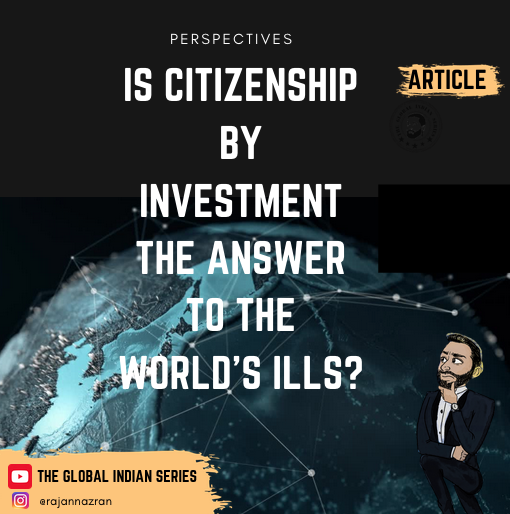The short answer is ‘no’. However, there are ways in which migration investment when carried out ethically can be a good thing for local people. Any country worth its salt these days has a Citizen by Investment Programme. Some are good, some are bad and some are indifferent.
If you are rich, then Citizenship by investment programme have much to recommend it. As with all things, though, one has to ask: Ciu bono? Who benefits?
Naturally, the chief beneficiaries are the applicant and the coffers of the country in which he as acquired residency. It is a simple quid pro quo: in return for a lump sum of money, you (and very possibly your dependents) are granted citizenship. Your are issued with a nice new shiny passport, thanks to which you can benefit from tax breaks, the ability to travel to a number of countries without a visa, the right to vote, access to high care and education.
Whether such arrangements benefit local people is a moot point.
The Preserve of the Super-Rich
At present, residence- and citizenship-by-investment migration is the preserve of the rich. They have the means to acquire citizenship or residency wherever they want.
And thanks to greater global connectivity and mobility, a new species has arisen: the 21 st Century Global Citizen, someone for whom geography and national boundaries are becoming increasingly irrelevant.
It is not uncommon for many people to hold dual citizenship but increasingly the ultra wealthy hold several passports. They may live in one country, but pay taxes in another. Such people are in the enviable position of being able to shop
around and choose the best country in which to acquire citizenship for them. If the government of country where they pay tax raises income tax, then they can elect to pay taxes else where.
There is much talk of how Citizenship by investment can benefit the people of the inbound countries. Pundits wax lyrical about how the private sector- entrepreneurs, and business leaders and so forth- and governments can use the revenue raised from CIP’s to invest in the economy.
Today, we ask: is this mere flannel? Or is there some truth to this claim?
The UK
The Tier 1 (Investor) Visa is the primary route to acquire British citizenship by investment, offering a fast-tracked path for investors to British citizenship.
To apply for a Tier 1 investor visa, you will need to donate a cool £2,000,000 to settle in 5 years, £5,000,000 to settle in 3 years or £10,000,000 to settle in 2 years.
This special investment visa allows holders and their dependants to reside in the UK and ultimately become eligible for UK citizenship. . Applicants, for example, must invest a minimum amount of investment into the UK and what is more, maintain that investment during their residency. In addition, You have to make investments in active and trading UK-registered companies.
All of which seems eminently sensible.
Is The Innovator Visa Worth it?
There are a number alternative to Tier 1. For example, the Innovator visa is aimed at entrepreneurs. To apply for the Innovator visa, you must satisfy the following requirements:
be able to obtain at least £50,000 for use in your business;
show a viable business concept which has the support of an endorsing body in the UK. You will need a business plan and evidence that you are active in the business, as well as evidence of your qualifications and experience in running a business;
provide evidence that you have the necessary funds to live in the UK;
employ at least two people in the business
have achieved the upper intermediate (B2) level of English.
To apply for Indefinite leave to remain in the UK, there is a sliding scale of investment. Thus, if you:
- Maintain your original £2 million investment, you can apply for ILR after five years
- Increase your investment to £5 million, you can apply for ILR after three years; and
- Increase your investment to £10 million, you can apply for ILR after two years.
So much for the UK. What of the Caribbean?
CIC-The Cure To The World's ills?St. Lucia
The Saint Lucia Citizenship by Investment programme was launched by the government on 1st January 2016. Applicants can apply for St Lucia’s citizenship programme via three main investment routes, donation, real estate investment and a government bond investment. Successful applicants will be granted a St Lucia passport which will enable them to gain visa-free travel to more than 157 countries worldwide. This represents over a third of the world’s GDP and includes access to the EU Schengen zone, UK, Hong Kong, Singapore and more.
At present, there are three ways to pay:
- Donation: $100 000 for one applicant
- Real estate Investment: applicants must invest in a government-approved real estate development for a minimum of $300,000, plus fees. The investment must be held for a minimum holding period of five years, after which it may be liquidated.
- A St Lucia Covid 19 Relief Bond: applicants the option to deposit a minimum of $250,000 into a refundable government bond
While it is it is plain to see how the Relief Bond will benefit St. Lucians, it is unclear what the revenue from Citizenship by Invest is spent on. The St. Lucian Government has yet to release any figures on this score. Nor do we know what ‘Real Estate Investment means’. It raises a number of questions:
- Is it just a question of buying some property?
- If the proposed development is a new one, what is its purpose and how will it benefit the commonweal?
- Will the development be sustainable? Will it be an eyesore? How are the building contracts awarded?
Portugal
Widely touted as the best scheme in Europe, the ‘Portugal Golden Visa Residence Program’ is a residence-by-investment program that allows one to live, work, and study in Portugal.
Launched in 2012, the Portuguese Government has been at pains to promote it internationally.
An investment of €500,000 (€280,000 or €350,000 reduced option) in real estate in Portugal will gain a residency permit for a family including dependent children.
If you’d rather you down the donation route, then the fee is EUR 1.5 million minimum capital transfer into a Portuguese bank account or approved investments.
Interestingly, the Portuguese Government that if you wish to set up a business in Portugal, you must create of a minimum of ten new jobs in a low population density area.
This seems eminently equitable. However, when it comes to property investment, the picture is mixed. For the most part, those who have acquired citizenship or residency by this route buy properties in Lisbon or the Algarve. Most of them are private residences, some are sea front properties ( fortunately, building restrictions and nature protection laws have prevented over-development) and some are what are termed ‘Integrated master-planned communities’ This means custom-designed gated apartment blocks with various amenities, gold courses and the like. There’s no denying that they are excellent investment opportunities, but they can be eyesores and seldom benefit local communities.
So, pace all those who have been lauding the Portuguese Programme, it something of a curate’s egg: good in parts.
-------------------------------










